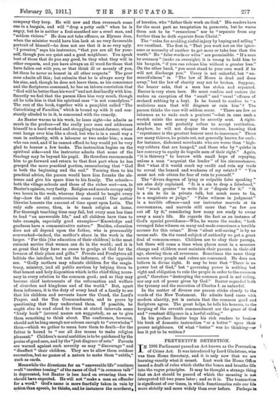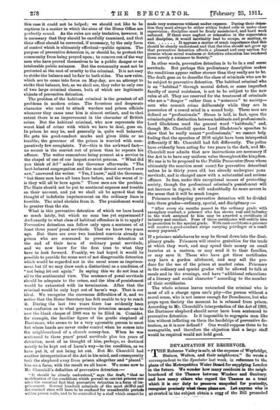PREVENTIVE DETENTION.
TN1908 Parliament passed an Act known as the Prevention
of Crime Act. It was introduced by Lord Gladstone, who was then Home Secretary, and it is only now that we are learning exactly what it meant. Last week the Home Office issued a draft of rules which clothe the bones and breathe life into the vague principles. It may be thought a strange thing that an Act should be passed of which the meaning is not interpreted till two years later ; and so it is. The transaction is significant of our times, in which functionaries role our life more strictly and more widely than ever before. Perhaps ia
this case it could not be helped; we should not like to be captious in a matter in which the aims of the Home Office are perfectly sound. As the rules are only tentative, however, it is necessary that they should be carefully examined, and that their effect should be corrected, if necessary, by the only form of control which is ultimately effectual—public opinion- The purpose of preventive detention is, or should be, to protect the community from being preyed upon ; to remove out of the way men who have proved themselves to be a public danger or an intolerable public nuisance. Bat the community must not be protected at the cost of cruelty to the criminal. It is not easy to strike the balance and be fair to both sides. The new rules, which are to come into force on May-day, are an attempt to strike that balance, but as we shall see, they refer to only one of two large criminal classes, both of which are legitimate objects of preventive detention.
The problem of the habitual criminal is the greatest of all problems in modern crime. The ferocious and desperate character who used to attack warders and prison officials whenever they came near him is almost extinct, and to that extent there is an improvement in the character of British crime. But the habitual criminal, who now represents the worst kind of crime with which we have to deal, goes on. In prison he may be, and generally is, quite well behaved.
He gets his good-conduct marks and gives little or no trouble; the governor of the prison is worried with com- paratively few complaints. Yet—this is the awkward fact— no sooner is the convict out of prison than he repeats his offence. The writer remembers being present at a service in the chapel of one of our largest convict prisons. " What did
you think of it?" asked the Governor afterwards. " The best-behaved congregation and the most devout service I ever
saw," answered the writer. "Yes, I know," said the Governor, " but these men have all been here before, and the worst of it- is they will all be here again." These men are the problem
The State should not be put to continual expense and trouble on their account, and yet we shall all be agreed that the
thought of indefinite imprisonment on the ordinary lines is horrible. The mind shrinks from it. The punishment would be greater than the sin.
What is this preventive detention of which we have heard so much lately, but which no man has yet experienced P And exactly to what class of habitual offenders is it to apply ? Preventive detention can follow only upon a sentence of at least three years' penal servitude. That we knew two years ago. But there are over two hundred convicts already in prison who are sentenced to preventive detention at the end of their term of ordinary penal servitude, and we now know for the first time to what they have to look forward. Frankly, we had hoped it would be possible to provide for some sort of not disagreeable detention which would be regarded not in the usual sense as imprison- ment but (if we may draw such a distinction) as a condition of "not being let out again." In saying this we do not lean at all to the sentimental view. The sentence of penal servitude should be adequate to the crime, and the idea of punishment
would be exhausted with its termination. After that the criminal would be only kept out of harm's way. That is our ideal. We recognise the enormous difficulties of it, and we notice that the Home Secretary has felt unable to try to reach it. During the last two years there has evidently been vast confusion as to what preventive detention meant—as to now the blank cheque of 1908 was to be filled in. Consider,
for example, the familiar figure of the gentle shepherd of Dartmoor, who seems to be a very agreeable person to meet
but whose hands are never under control when he comes into the neighbourhood of a church money-box. When he was sentenced to three years' penal servitude plus ten years of detention, most of ns thought of him, perhaps, as destined merely to he kept out of harm's way—in the condition, as we have put it, of not being let out. But Mr. Churchill had another interpretation of the Act in his mind, and consequently took the shepherd away from prison altogether and "placed" him on a farm, with the result we all know. We come now to Mr. Churchill's definition of preventive detention e It should be clearly understood," says the draft, " that no modification of the conditions which prevail in convict prisons can alter the essential fact that preventive detention is a. form of int- pr s 3ament. Saveral hundred criminals of the most skilful and det-rmined class will have to be confmed for considerable periods within prison walls, and to be controlled by a staff which cannot be made very numerous without undue expense. During their deten- tion they must always be either within locked cells or under close supervision; discipline must be firmly maintained, and hard work enforced. If there were neglect or relaxation in the supervision and discipline, it would inevitably lead to escape, or mutiny, or
vice. It appears a matter of much importance that this should be clearly understood and that the idea should not grow up that preventive detention affords a pleasant and easy asylum for persons whose moral weakness or defective education has rendered them merely a nuisance to Society."
In other words, preventive detention is to be in a real sense servitude. But perhaps this preliminary description makes the conditions appear rather sterner than they really are to be.
The draft goes on to describe the class of criminals who are to be subject to preventive detention. The habitual criminal who is an "habitual" through mental defect, or some imperfect faculty of moral resistance, is not to be subject to the new rules at all. They are reserved for the treatment of criminals
who are a " danger " rather than a " nnisance" to society—, men who commit crime deliberately while they are in possession of a sound mind in a sound body. These men are
defined as "professionals." Stress is laid, in fact, upon the criminologist's distinction between habitnals and professionals. Lord Gladstone used the general word "habituals," and, though Mr. Churchill quotes Lord Gladstone's speeches to show that he really meant " professionals," we cannot help feeling that the speeches of 19)8 might have been interpreted differently if Mr. Churchill had felt differently. The police have evidently been acting for two years in the dark, and Mr. Churchill now admits that new instructions are necessary if the Act is to have any uniform value throughout the kingdom. No one is to be proposed to the Public Prosecutor (from whom ultimately the sanction must come) for preventive detention) unless he is thirty years old, has already undergone pens servitude, and is charged anew with a substantial and serious offence. In fine, under this exceptional means of protecting society, though the professional criminal's punishment will not increase in rigour, it will undoubtedly be more severe in the sense that it will be much longer.
Prisoners undergoing preventive detention will be divided into three grades—ordinary, special, and disciplinary :—
" After every six months passed in the ordinary grade with exemplary conduct, a prisoner who has shown zeal and industry in the work assigned to him may be awarded a certificate of industry and conduct. Four of these certificates will entitle him to promotion to the special grade. With each certificate a prisoner will receive a good-conduct stripe carrying privileges or a small money payment."
If a prisoner misbehaves he may be thrust down into the disci. plinary grade. Prisoners will receive gratuities for the trade
at which they work, and may spend their money on small luxuries at a canteen, or may send it to their families, or may save it. Those who have got three certificates may have a garden allotment, and may sell the pro- duce for the use of the prison at market rates. Prisoners in the ordinary and special grades will be allowed to talk at meals and in the evenings, and have "additional relaxations of a literary and social character " according to the number of their certificates.
The whole scheme leaves untouched the criminal who is
most of all a charge upon one's pity—the person without a moral sense, who is not insane enough for Broadmoor, but who preys upon Society the moment he is released from prison..
According to Mr. Churchill's interpretation of the Act of 1908, the Dartmoor shepherd should never have been sentenced to preventive detention. Is it impossible to segregate men like him without inflicting on them the hardships of preventive de. tention, as it is now defined ? One would suppose them to be manageable, and therefore the objection that a large staff would be required would not hold good.







































 Previous page
Previous page